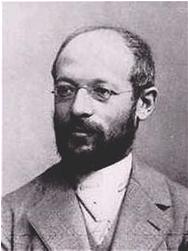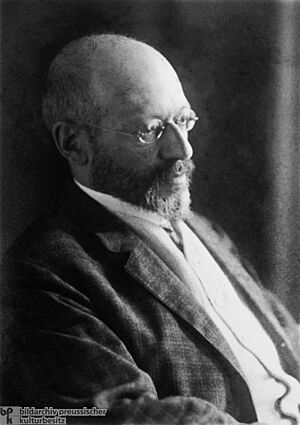Georg Simmel facts for kids
Quick facts for kids
Georg Simmel
|
|
|---|---|
 |
|
| Born | 1 March 1858 |
| Died | 26 September 1918 (aged 60) |
| Nationality | German |
| Alma mater | University of Berlin (PhD) |
| Era | 19th-century philosophy |
| Region | Western philosophy |
| School | Neo-Kantianism Lebensphilosophie |
| Institutions | University of Berlin University of Strasbourg |
| Notable students | György Lukács, Robert E. Park, Max Scheler |
|
Main interests
|
Philosophy, sociology |
|
Notable ideas
|
Formal sociology, social forms and contents, the tragedy of culture, web of group affiliation |
|
Influences
|
|
|
Influenced
|
|
Georg Simmel (1858–1918) was an important German thinker. He was a sociologist, a philosopher, and a critic. He studied how people interact in groups and how society works.
Simmel was one of the first German sociologists. He helped create a new way of thinking about society. He asked big questions like "What is society?" He also looked at how people become individuals and how society can sometimes break things apart. Simmel believed that "culture" is about how people grow through things they learn from history. He saw social and cultural things as "forms" (like rules or structures) and "contents" (like feelings or ideas). These two parts are always changing and influencing each other. Simmel's ideas were important for understanding cities, how people use symbols, and how social networks connect us.
He knew Max Weber, another famous sociologist. Simmel often wrote about personal character. He also explored topics like emotions and romantic love. His ideas helped shape a type of thinking called critical theory.
Some of Simmel's most famous books include The Philosophy of Money (1900) and The Metropolis and Mental Life (1903). He also wrote essays like "The Stranger" and "The Sociology of Space." He wrote a lot about art and other philosophers too.
Contents
About Georg Simmel
His Early Life and School
Georg Simmel was born in Berlin, Germany, in 1858. He was the youngest of seven children. His family had a Jewish background, but they had converted to Christianity. His father, Eduard Simmel, owned a candy store. His mother, Flora Bodstein, came from a Jewish family who had converted to Lutheranism. Georg himself was baptized as a Protestant.
When Georg was 16, his father died. He inherited a lot of money. Julius Friedländer, who founded a music publishing company, adopted Georg. This inheritance allowed Georg to focus on his studies.
In 1876, Simmel began studying philosophy and history at the Humboldt University of Berlin. He earned his doctorate degree in 1881. His main focus was on the ideas of the philosopher Immanuel Kant.
His Later Life
In 1890, Georg Simmel married Gertrud Kinel, who was also a philosopher. They had a son named Hans Eugen Simmel. Their home became a place where many smart people gathered to talk about ideas.
Simmel died in 1918 from liver cancer. This was shortly before World War I ended.
Simmel's Career
In 1885, Simmel started lecturing at the Humboldt University of Berlin. He taught philosophy, but also about ethics, logic, art, and sociology. His lectures were very popular, even attracting famous thinkers from Berlin.
Even though important people like Max Weber supported him, Simmel had a hard time getting a full professorship at a German university. This was partly because he was Jewish during a time of anti-Semitism. Also, he wrote for a general audience, not just for other academics. This made some professionals look down on his work. However, his inheritance allowed him to continue his studies and writing without needing a regular salary.
In 1909, Simmel helped start the German Sociological Association. This group brought together many important sociologists in Germany.
In 1914, Simmel finally became a full professor at the University of Strasbourg. But he didn't feel comfortable there. World War I had just started, and the university's lecture halls were turned into military hospitals. He stayed at Strasbourg until he died in 1918.
Simmel's Ideas
Simmel's work looked at four main things:
- How our minds work in social life.
- How people interact with each other.
- The overall "spirit" or mood of his time (called zeitgeist).
- The basic nature and future of humanity.
How People Connect
Simmel was very interested in how people form groups and interact. He called these "forms of association." These forms include:
- Subordination: When one person or group is under the control of another.
- Superordination: When one person or group has power over another.
- Exchange: When people give and take things, like goods, ideas, or feelings.
- Conflict: When people or groups disagree or fight.
- Sociability: The fun and friendly ways people interact just for the sake of being together.
Simmel believed that people have a natural desire to be social. He saw society as a "higher unity" made up of individuals. He described sociability as a "play-form of association," driven by friendliness and charm. For this to work, people shouldn't be too individualistic or aggressive. Instead, they should blend together in a spirit of pleasure.
Social Shapes
Simmel looked at how the size of a group affects people.
- In a dyad (a group of two people), each person can keep their individuality easily. There's no one else to shift the balance.
- In a triad (a group of three people), one person might become less important than the other two. This can threaten their individuality. If a triad loses a member, it becomes a dyad.
As a group gets bigger, it can become more separate and divided. This can make individuals feel more distant from each other. Simmel thought that in larger groups, it's harder to control individuals, which can be good. But it can also make people feel impersonal. To deal with large groups, individuals often join smaller groups, like families.
The value of something depends on how close or far it is from a person.
Life in the City
One of Simmel's most famous essays is "The Metropolis and Mental Life" (1903). He explored how living in a big city affects a person's mind. He looked at how the fast pace and many different experiences in a city change how people think and feel.
Simmel noted that city life can make people more reserved or "blasé." This means they might become less emotional or excited by things. This is a way for people to protect themselves from being overwhelmed by all the sights and sounds of the city. However, Simmel also saw positive changes. He believed that city life leads to more freedom for individuals.
The Philosophy of Money
In The Philosophy of Money, Simmel explored how money affects our lives and values. He believed that people create value by making objects. Then, they try to get those objects, and the effort involved gives them value. Things that are too easy to get or too hard to get are not seen as valuable. Scarcity, time, and difficulty all play a role in how much we value something.
Simmel thought that city life led to more specialized jobs and more use of money. As money transactions increased, people started focusing more on what a person could do, rather than who they were. Money became deeply connected to human values and beliefs.
The Stranger
Simmel had a special idea about "the stranger." A stranger is someone who is both far away and close at the same time. They are far enough that you don't know them well, but close enough that you could get to know them.
In a society, strangers are important. They can bring new ideas because they are not fully part of the group. Strangers often have a unique way of looking at things. They can be more objective and unbiased because they are not tied to the group's conflicts or opinions. People might feel more comfortable sharing secrets with a stranger because they believe the stranger won't use the information against them.
Historically, strangers often worked as traders or judges because they were seen as fair and neutral. Their opinions might not matter much because they are outsiders, but they also matter a lot because they can see things clearly without being influenced by others.
Secrets and Society
Simmel believed that in small groups, secrets are less common because everyone is more similar. But in larger, more diverse groups, secrets become more important. Secret societies are held together by the need to keep a secret. This creates a strong "we feeling" among members.
Even in close relationships like marriage, Simmel thought some secrets exist. If everything is revealed, a relationship might become boring. He felt that having some unknown parts is important for people to deal with their social world. The modern world relies on honesty, so a lie can be very damaging. Money also allows for more secrecy because transactions can be "invisible."
Fashion and Trends
Simmel saw fashion as a way for people to fit in with a group. But it also allows some people to show their individuality by being different. Fashion involves both the general culture and individual choices.
When something becomes fashionable, many people adopt it. Then, those who want to be different will choose something new. But in trying to be "unique," they often end up creating a new group of people who are all trying to be different in the same way. So, even being "different" can become a form of conformity.
Simmel's Main Books
Here are some of Georg Simmel's most important books:
- On Social Differentiation (1890)
- Introduction to the Science of Ethics (1892–1893)
- The Problems of the Philosophy of History (1892)
- The Philosophy of Money (1900)
- The Metropolis and Mental Life (1903)
- Kant (1904)
- The Philosophy of Fashion (1905)
- Kant and Goethe (1906)
- Religion (1906)
- Schopenhauer and Nietzsche (1907)
- Sociology: Inquiries into the Construction of Social Forms (1908)
- Main Problems of Philosophy (1910)
- Philosophical Culture (1911)
- Goethe (1913)
- Rembrandt (1916)
- Fundamental Questions of Sociology (1917)
- The View of Life (1918)
Images for kids
See also
 In Spanish: Georg Simmel para niños
In Spanish: Georg Simmel para niños
- Definitions of philosophy
- Kantianism
- Karl Mannheim
 | Jackie Robinson |
 | Jack Johnson |
 | Althea Gibson |
 | Arthur Ashe |
 | Muhammad Ali |



